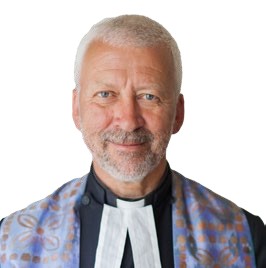‘Wisdom for our age’
The Rev Dr Richard Frazer explains why the Church is much more than a membership organisation.

The Rev Dr Richard Frazer
THERE was a time when the Church of Scotland exercised enormous influence over Scottish life and culture.
Often, that was to the good. I think of the Very Rev Professor Archibald Charteris, a minister of the Church and Biblical scholar in the 19th century. He established the Deaconess Hospital in Edinburgh, providing opportunities for women to train in nursing care. He founded this magazine, the Woman’s Guild, the Diaconate and the social care arm of the Church of Scotland, which we now know as CrossReach. Professor Charteris clearly had help from his wife, Catherine with all his innovations. Men getting all the credit is a perennial story.
Charteris’ story is just one example of the many ways in which the Church, through her understanding of the Gospel, has helped to shape civil society into a fair and just community through positive innovation. It is the story of the Church of Scotland as a resource and asset for everyone.
The influence of the Church is not always positive, however. Many years ago, an elderly woman came to our manse door. She was clearly in a distressed state. Not only was she full of grief, as her husband had died that morning, she also thought I might send her away as she did not attend church.
Of course, I agreed to conduct her husband’s funeral. The story that emerged over the next few days broke my heart. She was a profoundly faithful person but, as a child growing up in the Hebrides, her family had a visit from the local parish minister. She was about twelve years old and the minister saw her fiddle lying in the corner. He told her this was the Devil’s instrument and that she would go to hell if she persisted in playing it. It was therefore not a surprise that she had not known how to go back to church or if she would have been welcomed.
With great influence comes the temptation to exercise unwarranted power. There are plenty of stories in our history like that of the poor widow I met that day. I have come across many people who have hoped for a kindly, welcoming voice from the Church in a time of need and have not found it.
Over the years, I have seen the Church retreat more and more from the public square. I would never want to advocate a return to a time when the whole of society listened with attentive submissiveness to the voice of the Church. There is a replica of a ‘cutty stool’ in Greyfriars Kirk in Edinburgh, where people who transgressed could be shamed in front of the congregation. ‘Those days are passed now, and in the past they must remain’.
However, the Gospel is full of wisdom for ‘life in all its fullness’. The Church is not just a membership organisation for the benefit of those who attend Sunday by Sunday.
“
I have come across many people who have hoped for a kindly, welcoming voice from the Church in a time of need and have not found it."
The Church, with its many iconic buildings, its record of community service and its loyalty to Christ holds wisdom for our age. Many people in wider society want to see the church thrive as a force for good as a community asset.
We certainly need a humbler church, but we also need the vision of people like Archibald Charteris (and his wife), who see how Christ and his way can help our society into the way of peace, justice and a flourishing local community. When people see the Church contributing positively to wider society that is often when they start to become curious about the faith that lies behind action. ¤